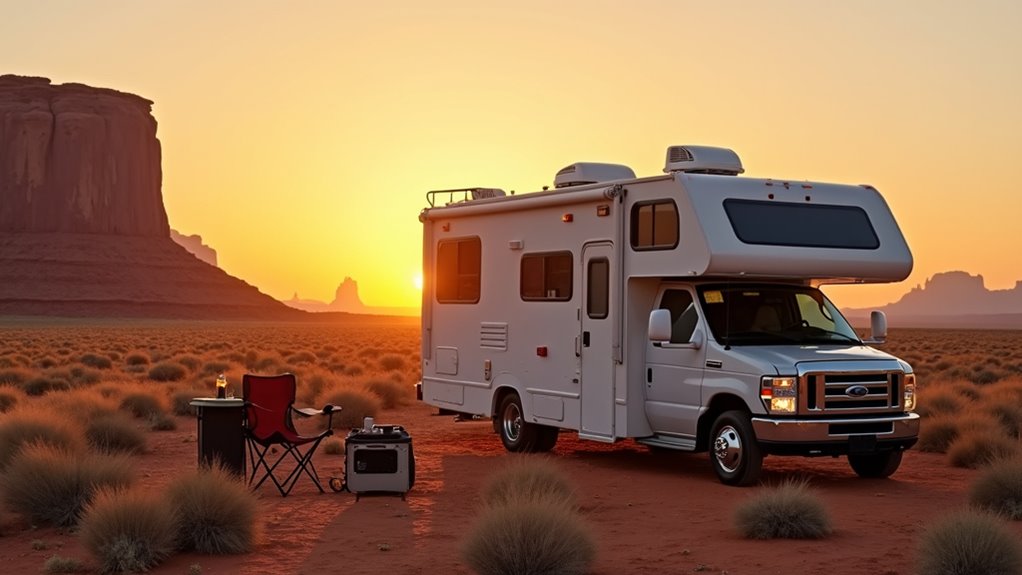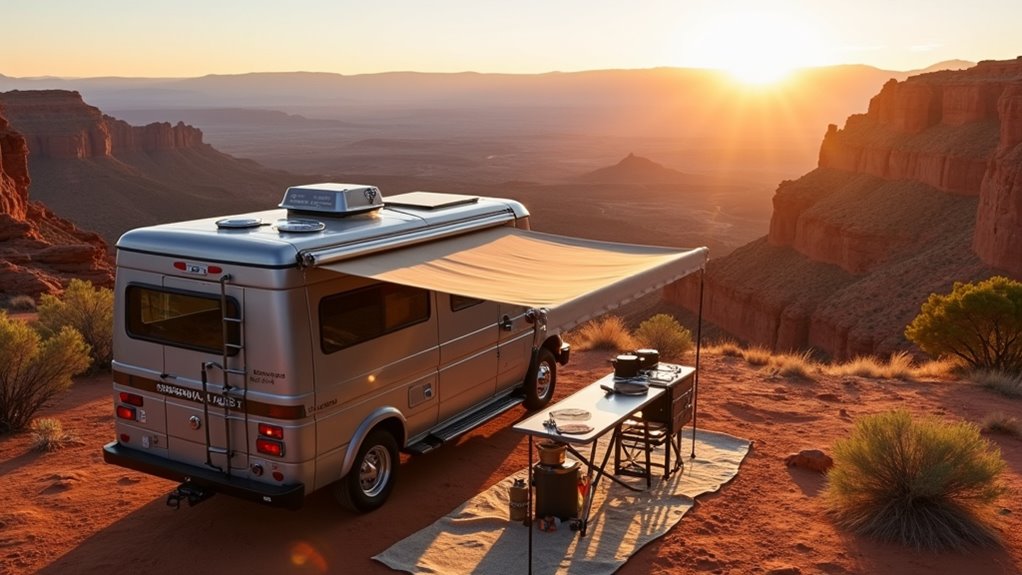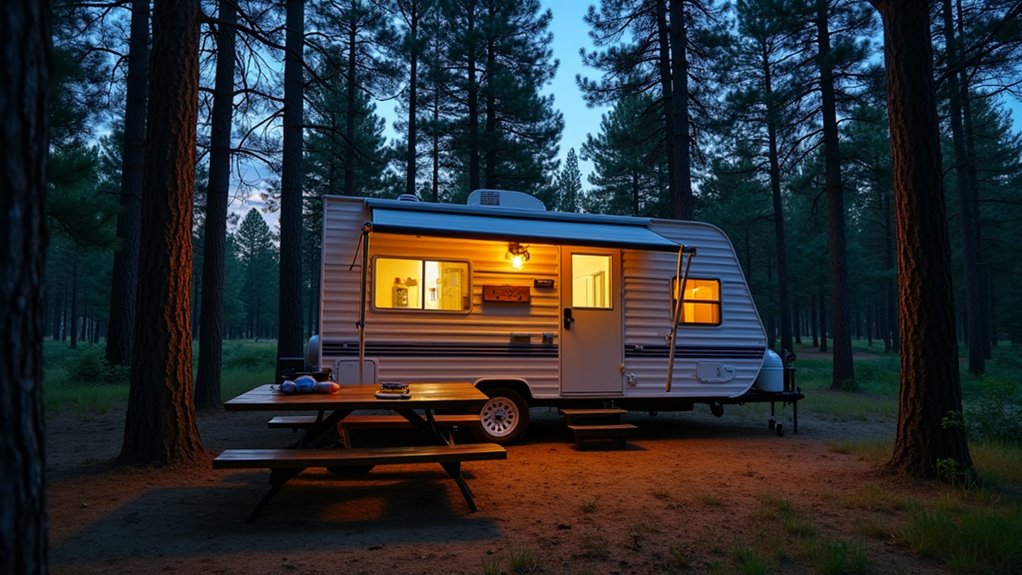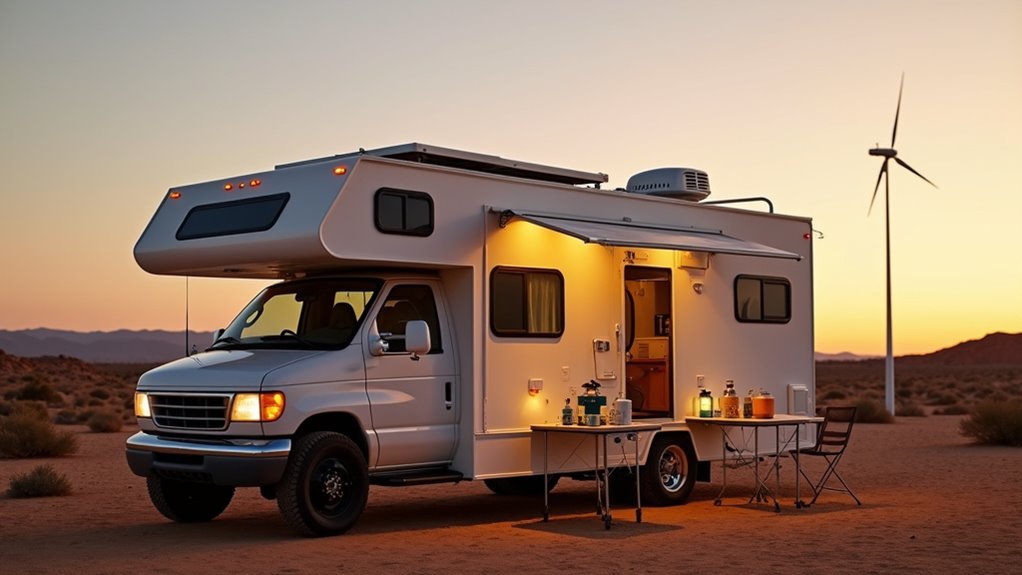Physical Address
304 North Cardinal St.
Dorchester Center, MA 02124
Physical Address
304 North Cardinal St.
Dorchester Center, MA 02124

Master the art of off-grid RV camping and discover how to explore America's wilderness while saving thousands on campground fees.
Did you know that over 1 million Americans have embraced the freedom of full-time RV living, with a growing percentage choosing to go off-grid? You’ll find that dry RV camping, or boondocking, offers an authentic way to explore America’s hidden gems while cutting your camping costs by up to 80%. Whether you’re a weekend warrior or planning an extended adventure, understanding the essentials of self-sufficient camping will transform how you experience the great outdoors.

When you’re seeking a more adventurous and cost-effective way to explore the great outdoors, dry RV camping offers an appealing alternative to traditional campgrounds.
Also known as boondocking, this style of camping means setting up your RV without hookups for water, electricity, or sewer connections.
Boondocking takes camping back to basics – just you and your RV, free from the tethers of utility hookups and modern conveniences.
You’ll enjoy significant cost savings since most dry camping spots are free or very inexpensive, compared to standard campground fees of $25-$80 per night. Camping with an RV can provide a great camping experience.
The freedom to camp on public lands, in remote locations, or even at breweries and farms gives you unprecedented flexibility for spontaneous travel.
You’ll discover greater privacy and a deeper connection to nature, away from crowded campgrounds. Some campers particularly enjoy the increased workload that comes with managing daily tasks like cooking and cleaning in a more rustic setting.
While you’ll need to carefully manage resources and plan for power needs, the trade-offs are worth it for budget-conscious travelers seeking authentic outdoor experiences.
Before starting on your dry camping adventure, you’ll need to equip your RV with essential gear that enables true self-sufficiency.
Focus first on power management by installing solar panels, reliable batteries, and an inverter to keep your electronics running. A backup generator provides extra peace of mind. Proper power management is crucial for extended off-grid stays.
Water management is equally important – invest in large water containers and efficient filtration systems. Careful water conservation will maximize your dry camping time.
Don’t forget waste management solutions like a cassette toilet or composting system, along with proper disposal equipment. Responsible waste disposal ensures you leave no trace.
Your kitchen setup should include a propane stove and food storage options that work without electricity. Pack cooking utensils and cookware to prepare meals efficiently at your campsite.
Always prioritize safety with a thorough first-aid kit, fire extinguisher, and emergency road kit. Comprehensive safety gear protects you in remote locations.
These essentials, combined with proper tools and lighting equipment, will help you handle most situations while enjoying the freedom of off-grid camping.

The perfect boondocking spot combines legal access, natural beauty, and practical functionality for your off-grid adventure.
Finding the ideal boondocking location requires balancing accessibility, scenic surroundings, and essential amenities for an authentic wilderness experience.
Start your search by identifying public lands like National Forests and BLM areas where dispersed camping is permitted. Use Google Maps’ satellite view to locate promising forest service roads and established clearings.
Look for telltale signs of previous camping, such as fire rings or cleared areas, which often indicate suitable spots. Most public lands enforce a 14-day limit for camping in one location. You’ll want level ground for stable parking and enough space to maneuver your RV.
Choose locations with moderate temperatures to minimize resource consumption, and guarantee you have cell reception or emergency communication options. Essential tips for camping off the grid can help ensure a successful boondocking experience.
Remember to verify local regulations on official websites before setting up camp.
While seeking seclusion, staying near managed areas like state parks can provide an extra layer of security, especially if you’re new to boondocking.
Managing power effectively while dry camping requires a strategic blend of modern technology and conservation techniques.
Start by upgrading to lithium iron phosphate batteries for superior performance and longer life, or opt for dual 6V golf cart batteries to extend your reserve capacity. You should calculate your daily power needs carefully to avoid depleting your batteries.
Install solar panels between 100W to 400W based on your usage, and keep them clean and properly oriented for maximum efficiency. Consider layering up clothing instead of running the power-hungry RV furnace to stay warm while conserving energy.
Switch to LED lights and battery-operated fans to minimize power draw. When possible, use propane appliances instead of electrical ones for tasks like refrigeration and water heating.
While traveling, take advantage of your tow vehicle’s charging capabilities through a proper isolator system to maintain battery levels between stops.

Successful dry camping hinges on your ability to conserve water and manage waste efficiently. You should aim to start by filling your fresh water tank completely and upgrading to water-conserving fixtures like low-flow faucets and showerheads with aerators.
Install tank monitors to track your water levels and avoid unexpected shortages. Practice the Navy shower technique to significantly reduce water consumption during bathing. Camping water filters can also help ensure clean drinking water during your dry camping adventures.
For daily conservation, opt for sponge baths instead of showers, and consider using a solar shower when possible. Collect the initial cold water flow in buckets for later use, and minimize dishwater usage by incorporating paper towels for cleaning.
You’ll need to regularly empty your gray and black tanks at proper dump stations – plan your route to include these locations. Consider portable toilets and additional water bladders to extend your boondocking capabilities while maintaining proper sanitation.
Before heading out for your dry camping adventure, familiarize yourself with both legal requirements and safety protocols to guarantee a trouble-free experience.
You’ll need to secure proper permits and verify that your intended camping spot allows overnight stays, as many public lands restrict camping within certain distances of roads and water sources. Regular inspections and compliance with sanitation standards help protect both campers and the environment.
Always carry essential safety equipment, including a well-stocked first aid kit and reliable communication devices. Essential camping tips can also enhance your experience and safety.
Monitor weather conditions and be aware of local wildlife patterns. You’re legally required to follow fire safety regulations and properly dispose of waste.
Remember that most public lands enforce a 14-day stay limit within any 28-day period. You’ll face hefty fines for violations, so take time to understand local regulations.
Maintaining awareness of nearby amenities and emergency services can enhance both your safety and camping experience.

While traditional vacations can drain your wallet, dry RV camping offers substantial financial advantages that make adventure travel more accessible. RV camping is better than tent camping in terms of cost-effectiveness.
By choosing off-grid camping spots, you’ll eliminate nightly campground fees entirely, which can save you hundreds of dollars per week. You’ll also maximize savings by cooking your own meals instead of dining out and using your RV’s built-in facilities.
Strategic planning plays an essential role in off-grid cost reduction. Using fuel efficiency apps to locate the best gas prices and planning routes that minimize fuel consumption will greatly lower your travel expenses. Even with today’s fuel prices, RV travel costs remain significantly lower than traditional vacation expenses.
You can further boost your savings by performing basic DIY maintenance and participating in free outdoor activities like hiking and stargazing. When combined, these strategies can help you achieve up to 60% savings compared to conventional vacations.
Despite its reputation as an eco-friendly alternative to hotels, dry RV camping can greatly impact natural environments if not done responsibly.
To minimize your footprint, park only in designated spots and avoid driving off-trail to prevent soil compaction and vegetation damage. You’ll need to manage waste carefully by packing out all trash, sorting recyclables, and properly disposing of wastewater in designated facilities. Using designated areas helps prevent continuous land degradation that occurs from repeated RV traffic.
Be mindful of your resource consumption – use water sparingly, limit generator use, and consider solar power alternatives. Embracing responsible camping can lead to a greener experience.
Keep your food secured and never feed wildlife, as this disrupts their natural behaviors and creates dependency. When possible, opt for eco-friendly cleaning products and stick to established camping areas.
These practices won’t just protect the environment – they’ll also preserve these natural spaces for future adventurers.
Dry RV camping calls like an untamed wilderness waiting to be explored. You’ll find freedom dancing with the stars, far from crowded campgrounds and costly hookups. By mastering power management, water conservation, and responsible camping practices, you’re not just saving money – you’re crafting authentic outdoor experiences. Let the open road be your guide as you embrace this sustainable, budget-friendly way to connect with nature’s raw beauty.